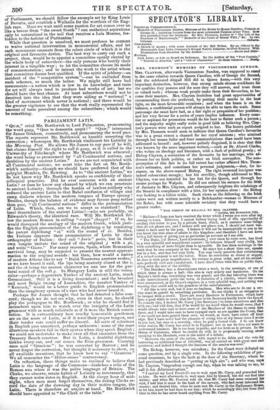PARLIAMENT LATIN.
" Qtrie," cried Mr. Borthwick to Lord Palmerston, pronouncing the word quay, "Qum te dementia ccepit ?" "Qum," interposed Sir James Graham, correctively, and pronouncing the word quee. The reports represent Mr. Borthwick as humbly accepting the correction ; whereupon Mr. Borthwick vindicates his Latinity in the Morning Post. He allows Sir James to say quee if he will, but claims himself the right to call it quay, as it is called in the Univerqty of Edinburgh where Mr. Borthwick was educated; the word being so pronounced by "all Continental nations, and doubtless by the ancient Latins." As we are not acquainted with all Continental nations, we must take the fact on Mr. Borth- wick's authority—though we should have preferred that of the polyglot Member, Dr. Bowring. As to "the ancient Latins," we do not know why Mr. Borthwick speaks so confidently of their colloquial practices. Did he ever converse with an ancient Latin? or does he know any channel by which we can penetrate to ancient Latinity, through the hordes of lawless soldiery who reduced the ancient Latin to that Babel confusion of village and camp dialects whence the modern tongues of Europe sprang? Besides, though the balance of evidence may favour quay rather than quee, "all Continental nations" differ in the pronunciation of Latin. Which, then, are we to accept as standard? The local descendants of the ancient Latins ?—who are probably, on Edwards's theory, the identical race. Will Mr. Borthwick fol- low the modern Roman in calling " ccepit" ehaypit? If so, he would disregard the analogy of the modern Greek, which justi- fies the English pronunciation of the diphthong ce by rendering the parent diphthong " oi" with the sound of ee. Besides, the Italians disprove their pronunciation of Latin by their orthography of Italian : they call "Jovis" yovis, but in their own tongue imitate the sound of the original j with a gi, and write Glove." For many reasons, Spain, where Romanism survived long, may be supposed to present the nearest approxi- mation to the original sounds : but then, how would a native of modern Athens like to say "Italiâ Teucrorun avertere rechen," as we have heard it said, the lips being scarcely closed at the e, and the ch being the nearest character we can use for the gut- tural sound of the soft g. In Hungary Latin is still the verna- cular—perhaps a degenerate Yankee of the ancient Latin, much Germanized. Still it is a living descendant ; and the broadest and most Belgic twang of Lancashire, the nasalest Yankee of " Kentuck," would be a better guide to English pronunciation than the imaginary system of a race who had never heard it.
Perhaps Sir James thought that he had detected a false con- cord ; though we do not see why, even in that case, he should play the pedagogue to Mr. Borthwick ; or why he should feel it incumbent upon him to watch over the integrity of the Latin grammar with as much solicitude as if it were the British consti- tution. It is extraordinary how touchy honourable gentlemen are on the score of Latin, as if it were their proper tongue, and their tender ears could suffer no discord. All sorts of solecisms in English pass unnoticed, perhaps unknown : some of the most illustrious speakers fail in their syntax when they speak English ; we could not undertake to make even all that emanates from the Treasury Bench construe. But in Latin, a doubtful diphthong tickles every ear, and out comes the Eton grammar. Canning once said " Granicus " : he was corrected by Barrow ; and he never forgot the correction, but thought it necessary to show, on all available occasions, that he knew how to say " Grantcus." We all remember the" lillee-onnee" controversey.
On reflection, these things make us inclined to believe that Latin is the language of the Commons--doubtless a relic of the Roman 83ra when it was the polite language of Britain. The Clerks, we observe, retain habits of Latinity so inveterately, that they cannot write dates in English. At the sleepy hour of mid- night, when men most forget themselves, the dozing Clerks re- cord the date of the dawning day. in their native tongue, the Latin. There is therefore an umpire at hand. Mr. Borthwick Should have appealed to "the Clerk at the table."


























 Previous page
Previous page